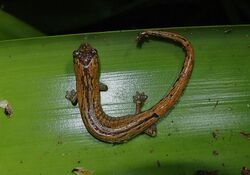Biology:Savage's salamander
| Savage's salamander | |
|---|---|

| |
| Scientific classification | |
| Domain: | Eukaryota |
| Kingdom: | Animalia |
| Phylum: | Chordata |
| Class: | Amphibia |
| Order: | Urodela |
| Family: | Plethodontidae |
| Genus: | Bolitoglossa |
| Species: | B. savagei
|
| Binomial name | |
| Bolitoglossa savagei Brame and Wake, 1963[2]
| |
Savage's salamander (Bolitoglossa savagei), also known as Savage's mushroomtongue salamander, is a species of salamander in the family Plethodontidae.[3] It is endemic to the Sierra Nevada de Santa Marta in northern Colombia (Magdalena Department).[1][4] The record from Venezuela represents another species,[4] likely Bolitoglossa guaramacalensis.[1][5] The species is named after Jay M. Savage, an American herpetologist.[2]
Description
Males measure 36–52 mm (1.4–2.0 in) and females 38–55 mm (1.5–2.2 in) in snout–vent length. The tail is slightly shorter or longer than the body. The hands and feet are partially to nearly fully webbed. Colouration is variable, dorsally light or dark brown, with a clear longitudinal band, mottling, or simply uniform.[2]
Habitat and conservation
Bolitoglossa savagei is found in montane forests at elevations of 1,000–2,140 m (3,280–7,020 ft) above sea level.[1] It primarily lives (and breeds) in arboreal bromeliads, but may sometimes occur in decaying logs and stumps or under decaying leaves.[1][2] It may co-occur in bromeliads with the frog Pristimantis tayrona.[6]
Habitat loss from deforestation is a threat to this species.
References
- ↑ 1.0 1.1 1.2 1.3 1.4 IUCN SSC Amphibian Specialist Group (2017). "Bolitoglossa savagei". IUCN Red List of Threatened Species 2017: e.T59204A49345792. doi:10.2305/IUCN.UK.2017-2.RLTS.T59204A49345792.en. https://www.iucnredlist.org/species/59204/49345792. Retrieved 16 November 2021.
- ↑ 2.0 2.1 2.2 2.3 Brame, A. H., Jr.; Wake, David B. (1963). "The salamanders of South America". Contributions in Science. Natural History Museum of Los Angeles County 69: 1–72. https://archive.org/details/TheSalamandersOfSouthAmerica.
- ↑ Frost, Darrel R. (2016). "Bolitoglossa savagei Brame and Wake, 1963". Amphibian Species of the World: an Online Reference. Version 6.0. American Museum of Natural History. http://research.amnh.org/vz/herpetology/amphibia/Amphibia/Caudata/Plethodontidae/Hemidactyliinae/Bolitoglossa/Bolitoglossa-savagei. Retrieved 19 March 2016.
- ↑ 4.0 4.1 Acosta Galvis, A. R. & D. Cuentas (2016). "Bolitoglossa savagei Brame & Wake, 1963". Lista de los Anfibios de Colombia V.05.2015. www.batrachia.com. http://www.batrachia.com/orden-caudata/bolitoglossa/bolitoglossa-savagei/. Retrieved 19 March 2016.
- ↑ Schargel, W. E.; J. E. García-Pérez; E. N. Smith (2002). "A new species of Bolitoglossa (Caudata: Plethodontidae) from the Cordillera de Merida, Venezuela". Proceedings of the Biological Society of Washington 115: 534–542. https://www.biodiversitylibrary.org/part/49271.
- ↑ Lynch, John D.; Ruíz-Carranza, P. M. (1985). "A synopsis of the frogs of the genus Eleutherodactylus from the Sierra Nevada de Santa Marta, Colombia". Occasional Papers of the Museum of Zoology, University of Michigan 711: 1–59. http://deepblue.lib.umich.edu/handle/2027.42/57147.
Wikidata ☰ Q2212025 entry
 |


